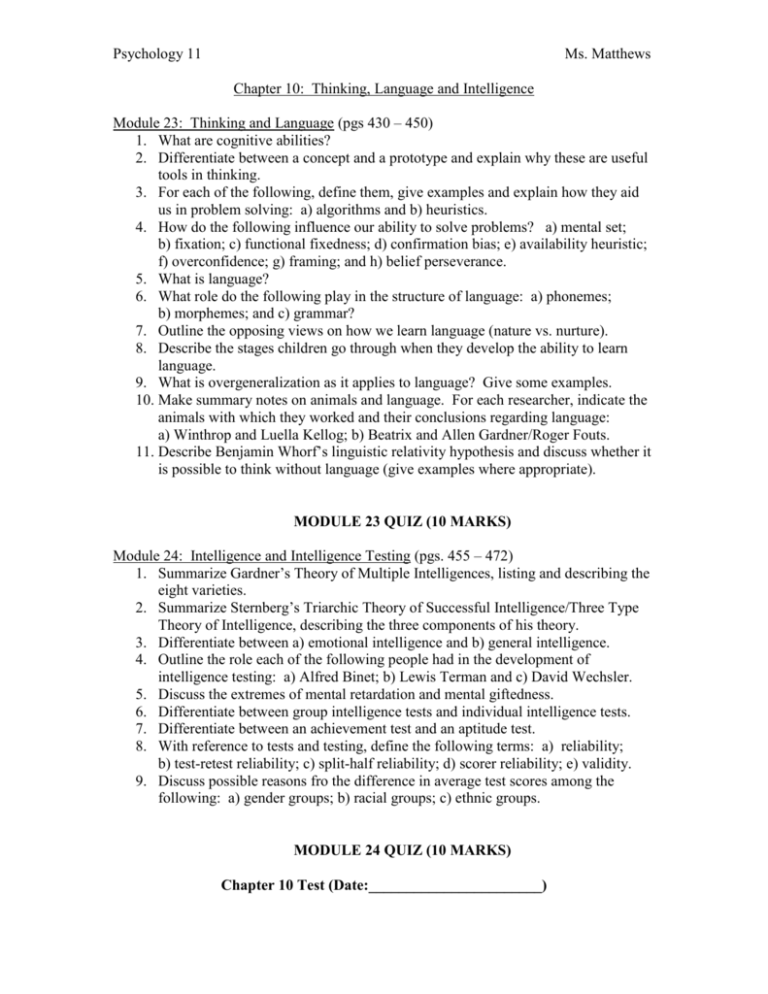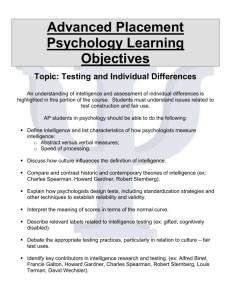Psychology 11
advertisement

Psychology 11 Ms. Matthews Chapter 10: Thinking, Language and Intelligence Module 23: Thinking and Language (pgs 430 – 450) 1. What are cognitive abilities? 2. Differentiate between a concept and a prototype and explain why these are useful tools in thinking. 3. For each of the following, define them, give examples and explain how they aid us in problem solving: a) algorithms and b) heuristics. 4. How do the following influence our ability to solve problems? a) mental set; b) fixation; c) functional fixedness; d) confirmation bias; e) availability heuristic; f) overconfidence; g) framing; and h) belief perseverance. 5. What is language? 6. What role do the following play in the structure of language: a) phonemes; b) morphemes; and c) grammar? 7. Outline the opposing views on how we learn language (nature vs. nurture). 8. Describe the stages children go through when they develop the ability to learn language. 9. What is overgeneralization as it applies to language? Give some examples. 10. Make summary notes on animals and language. For each researcher, indicate the animals with which they worked and their conclusions regarding language: a) Winthrop and Luella Kellog; b) Beatrix and Allen Gardner/Roger Fouts. 11. Describe Benjamin Whorf’s linguistic relativity hypothesis and discuss whether it is possible to think without language (give examples where appropriate). MODULE 23 QUIZ (10 MARKS) Module 24: Intelligence and Intelligence Testing (pgs. 455 – 472) 1. Summarize Gardner’s Theory of Multiple Intelligences, listing and describing the eight varieties. 2. Summarize Sternberg’s Triarchic Theory of Successful Intelligence/Three Type Theory of Intelligence, describing the three components of his theory. 3. Differentiate between a) emotional intelligence and b) general intelligence. 4. Outline the role each of the following people had in the development of intelligence testing: a) Alfred Binet; b) Lewis Terman and c) David Wechsler. 5. Discuss the extremes of mental retardation and mental giftedness. 6. Differentiate between group intelligence tests and individual intelligence tests. 7. Differentiate between an achievement test and an aptitude test. 8. With reference to tests and testing, define the following terms: a) reliability; b) test-retest reliability; c) split-half reliability; d) scorer reliability; e) validity. 9. Discuss possible reasons fro the difference in average test scores among the following: a) gender groups; b) racial groups; c) ethnic groups. MODULE 24 QUIZ (10 MARKS) Chapter 10 Test (Date:_______________________)






